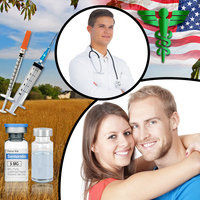
Don't play Roulette with your health...
Here's a list of what dangers there are with HGH abuse, and how we make sure you do not suffer from side effects associated with taking too much Human Growth Hormone.
Growth Hormone Replacement Therapy is a safe treatment option for those suffering from low levels of Human Growth Hormone (HGH Deficiency).
Video Link: https://vimeo.com/388383288
Video Download: Hgh Side Effects Risks And Dangers Of Growth Hormone Therapy Part 1
Video Stream: Hgh Side Effects Risks And Dangers Of Growth Hormone Therapy Part 1
Video Link: https://vimeo.com/388575685
Video Download: Hgh Side Effects Risks And Dangers Of Growth Hormone Therapy Part 2
Video Stream: Hgh Side Effects Risks And Dangers Of Growth Hormone Therapy Part 2
There are few, if any, side-effects when Human Growth Hormone (HGH) is prescribed by the medical professionals at our HGH clinic and used safely and responsibly under physician guidelines.
We will provide both the correct, precise, individualized Growth Hormone treatment that is specifically geared toward you, and give you detailed, easy-to-follow directions as to how to use recombinant growth hormone injections properly.
However, there are some side effects associated with the abuse of growth hormone. Notice the word abuse, not use. Our patients will not experience these potentially severe side effects, but it is crucial for you to be aware of any potential complications. Let's take a look at them.
HGH and Carpal Tunnel Syndrome
Growth hormone abuse has been linked to Carpal Tunnel Syndrome and arthritis. In some instances, Carpal Tunnel Syndrome occurs due to edema (which can also be caused by HGH abuse) over-hydrating the cells in the area of the wrist, which increases pressure on the joint while also aggravating underlying arthritis issues.
Keep in mind that the narrow cavity where the tendons connect the wrist to the hand can become inflamed from the usage of HGH in high doses.
Long-term abuse may also cause Carpal Tunnel Syndrome, because growth hormone is incredibly powerful, which increases the rate at which bones and muscles grow, in addition to other organs.
Therefore, if the cartilage of the joints grows as a result of human growth hormone abuse, this can lead to increased pain and reduced ability to have the full range of motion of the wrists.
HGH and Arthritis
Abuse of growth hormone can lead to arthritis in individuals who ignore the recommended dosage for long periods.
Arthritis occurs for the same reason as Carpal Tunnel Syndrome described above. Growth hormone accelerates the growth of cartilage and bone which can cause joints to grow abnormally.
After the epiphyseal plates close at the end of puberty, the bones are no longer able to develop normally. However, they can still grow in a distorted way, which can contribute to joint issues years later.
HGH and Edema
Edema can occur after a short period of Growth Hormone Abuse. The definition of edema is defined as excess water retention, which causes bloating in some parts of the body. With human growth hormone abuse, edema occurs as a result of extracellular fluid. If left  untreated, edema can result in many severe and adverse health problems.
untreated, edema can result in many severe and adverse health problems.
For example, edema in the legs can cause blood vessels and veins to break and rupture, which can prevent the body from circulating blood efficiently.
Clinical and anecdotal evidence regarding extracellular edema and HGH suggests that in most cases edema is relieved quickly after abuse of growth hormone stops.
HGH and Gigantism
Gigantism is defined as the development of abnormally large size from excessive growth of the long bones accompanied by muscular weakness and sexual impotence and usually caused by hyperpituitarism before normal ossification is complete — also called macrosomia. In other words, extreme, excessive growth.
Gigantism can also be the result of growth hormone abuse in children and teenagers when administered before the epiphyseal plates close at the end of puberty. The result?
Children grow too large for their frame which can lead to physiological complications later in life such as joint pain and arthritis. Many younger individuals (or their unscrupulous parents or trainers) believe they can use Human Growth Hormone to increase size advantage across the board for the youth to dominate in athletic competition.
The primary side effect of this is abnormal bone growth. Ironically, this can make individuals frailer than they would be at their average adult height. Also, this form of growth hormone abuse can increase the size of internal organs, causing a wide array of health problems.
If that weren't horrifying enough, Gigantism could distort the features of the hands, feet, and face, leading to a hideous, Neanderthal-like appearance. Generally, gigantism is the result of a chemical imbalance in the brain's pituitary gland (think of the professional wrestler Andre the Giant).
However, there have been cases where symptoms of gigantism occurred as a result of adolescent growth hormone overuse.
HGH and Acromegaly
Acromegaly is the adult form of gigantism. Because the epiphyseal plates have closed, the adult body can no longer grow in height.
Acromegaly is when the bones of the hands, feet, and face grow abnormally as a result of excess HGH levels. Long-term human growth hormone overuse results in the bones growing unusually thick, calcifying more and more around the bone, and changing the entire shape of the bones, although not lengthening them in any significant way.
This can make hands and feet susceptible to severe arthritis and wrists prone to carpal tunnel syndrome. Acromegaly is one of two side-effects of Human Growth Hormone overuse that is not reversed by ending HGH abuse. Changes in bone structure are permanent.
HGH and Diabetes
Although HGH Replacement Therapy can benefit patients suffering from diabetes, the abuse of growth hormone can be risky for diabetics. Growth hormone and insulin are both hormones that affect metabolism. Insulin regulates the breakdown of carbohydrates and sugars, while HGH speeds up the breakdown of fat and increases cellular metabolism.
 HGH converts into Insulin-like Growth Factor 1 (IGF-1) in the liver, and has a similar molecular composition to insulin. Insulin IGF-1 can compete with insulin at receptor sites.
HGH converts into Insulin-like Growth Factor 1 (IGF-1) in the liver, and has a similar molecular composition to insulin. Insulin IGF-1 can compete with insulin at receptor sites.
Here's the problem: Human growth hormone abuse may cause these receptor sites to favor insulin over IGF-1 by a considerable margin, which can inhibit the ability of insulin to regulate blood-sugar levels...possibly resulting in severe consequences.
HGH Deficiency and Hypothyroidism
Hypothyroidism (a condition in which the thyroid gland doesn't produce sufficient thyroid hormone) can be linked to growth hormone deficiency.
Human growth hormone does not cause hypothyroidism, and there is evidence that HGH replacement therapy can treat Hypothyroidism. However, abuse of HGH can cause the thyroid gland to go haywire and release lower levels of thyroid hormone.
After growth hormone abuse has stopped, the thyroid gland may be unable to return to normal function, which decreases energy levels and increases the risk of weight gain when the therapy ends. The thyroid gland plays a vital role in both hunger and energy levels.
When thyroid hormone levels are low, the thyroid sends a message of hunger, causing the body to store more fat and the brain to want more food...exactly what no one needs, especially diabetics.
Additionally, the constant hunger warning signal prevents other hormones from functioning correctly and can wear out both body and mind, leading to fatigue.
Anyone interested in growth hormone replacement therapy should undergo testing for hypothyroidism because hypothyroidism causes many symptoms of HGH deficiency and may even be able to be treated with safe levels of growth hormone.
HGH and Liver Damage
If growth hormone levels in the blood are too high for too long, this may result in permanent liver damage. The liver is only able to convert a certain amount of growth hormone at any particular time.
When the body receives a long-term overdose of HGH, the liver is overloaded, which may cause the organ to suffer damage. The liver is one of the slowest organs to heal, and can easily be damaged permanently.
Also, liver damage is the primary reason why oral growth hormone and growth hormone releasers should be avoided. Stomach acid breaks down both human growth hormone and the components of growth hormone releasers, sending rogue amino acids to the liver. When this flooding occurs, the organ can take massive damage over time.
HGH and Lower Pituitary Gland Function
When HGH is abused, the excess growth hormone flooding the body results in the body sending signals to the pituitary gland to severely restrict endogenous (proceeding from within; derived internally, natural) release of HGH.
This process is known as negative feedback, and when more growth hormone is introduced into the human body than the pituitary can create, this signals negative feedback mechanisms to ramp up to the absolute max.
Negative feedback can also lower pituitary function in patients with human growth hormone deficiency.
This is the reason that patients in their 30s, 40s, and 50s receive recommendations to take one or two days off from treatment per week to allow the pituitary gland to resume production of human growth hormone as naturally as possible.
recommendations to take one or two days off from treatment per week to allow the pituitary gland to resume production of human growth hormone as naturally as possible.
This is also the reason some doctors often recommend Sermorelin Acetate Therapy over HGH Injections. This allows the pituitary gland to produce more endogenous growth hormone by stimulating the pituitary with synthetic GH-RH analog.
There are other potential side-effects of HGH abuse, but these are the most common.
Who Should Avoid Recombinant Human Growth Hormone Injections
HGH and Cancer patients. Although human growth hormone has not been shown to cause cancer, there is still evidence that HGH may exacerbate existing malignant tumors. Growth hormone's primary function is to increase cellular metabolism.
In healthy patients, this is beneficial, but in patients with active cancers, this may interfere with anti-cancer treatment, thus potentially pouring gasoline on a raging fire.
You should ALWAYS discuss this with your doctor and be aware of the potential risks of growth hormone, especially if you have a family history of reproductive and prostate cancer.
HGH and Heart Surgery
If you are currently being treated for a severe health issue, you should avoid growth hormone therapy until the medical issue is resolved.
Also, if you are facing heart or abdominal surgery, do not consider human growth hormone therapy until your operation is successful, and you have been given the green light by your physician.
HGH and Breast Feeding
Women who are breastfeeding or pregnant should talk to their physician about growth hormone replacement therapy. This is due to the uncertainty as to whether HGH injections affect the fetus or is secreted through the milk ducts.
 Although there is evidence that growth hormone may be an effective diabetes treatment, patients with diabetes should closely monitor blood glucose levels.
Although there is evidence that growth hormone may be an effective diabetes treatment, patients with diabetes should closely monitor blood glucose levels.
As mentioned earlier, growth hormone and diabetes both affect human metabolism in unique but somewhat interconnected ways.
Therefore, you will need your medical professional to be aware of your diabetes and monitor your treatment accordingly.
All patients who consider growth hormone replacement therapy should be tested for other hormone levels to ensure HGH will provide the maximum benefit to the patient.
How to Avoid the Side-Effects Human Growth Hormone Replacement Therapy
Human growth hormone replacement therapy causes few or no side effects...when appropriately used, as intended. Some rules need to be followed to prevent the onset of symptoms such as edema and cranial hypertension as the body transitions to a higher level of growth hormone.
When HGH Therapy starts, it is recommended to begin at a dose slightly lower than typically recommended. Every patient has unique growth hormone needs. What may bring optimal health to one patient may not produce the same benefits for another.
If the body seems like it could respond to higher levels of growth hormone, the dosage can be adjusted slightly upwards. Also, growth hormone produces minimal side effects when regularly administered in low doses and under physician supervision.
The main reason those who abuse growth hormone suffer side effects is that they regularly use doses that far exceed the recommended amounts.
This is why it is recommended so strongly that patients with human growth hormone deficiency inject themselves daily with HGH in the recommended dosage.
Why is this so important? Because the medication will more closely imitate natural growth hormone production, which will help the body respond positively to the introduction of higher levels of HGH. Some patients even choose to take two small injections twice a day.
These patients usually take one dose before bed and one injection just before physical exercise. These are the two periods of the day in which growth hormone secretion is at its peak.
Never take HGH injections that exceed two units. There is a large body of clinical evidence concluding that growth hormone replacement therapy, when used responsibly, causes few or no significant side effects.
Many people use growth hormone to boost their athletic performance and, in their quest to achieve victory, take HGH injections, which far exceed a healthy human dose. Side-effects from human growth hormone abuse tend to develop over time.
Few side effects occur immediately, and this tends to encourage individuals to abuse the highly potent hormone and disregard all possible harmful consequences.
If you have abused growth hormone in the past, the good news is this: most of the effects are reversible. However, there are specific issues, such as acromegaly and liver damage that cannot be reversed. Keep in mind that these are symptoms that are the result of the severest forms of abuse.
The Protocol for Safe and Effective Hormone Replacement Therapy
For all patients, human growth hormone replacement therapy will feature a relatively low yet potent dose of one to two units of growth hormone per day. This minimizes the risk of side-effects while maximizing the potential benefits of therapy.
For patients older than 35 who are suffering from the symptoms of low growth hormone and have been diagnosed with a deficiency of the hormone, the standard dose is no less than one and no more than 2 IU per injection (the dose will depend on your IGF-1 levels, starting treatments should be below 1IU).
Although older patients may choose to undergo growth hormone replacement therapy seven days a week, younger patients in their thirties, forties, and fifties are generally recommended to inject HGH Shots five consecutive days per week, taking two days off. These days off are usually during the weekend, but this is a matter of personal preference.
You need to be aware of the dangers of growth hormone abuse. But it is also necessary to realize that HGH Replacement Therapy is a safe and effective means to treat the loss of growth hormone that occurs as a result of the aging process. Although growth hormone deficiency is a natural occurrence, it need not debilitate your life.
Human growth hormone injections have the ability to turn back the clock, allowing patients to dodge the afflictions of aging: weakening muscles and loss of strength...maddening joint aches and pains...hideous wrinkles...frightening, frustrating brain fog, forgetfulness, and mental confusion...lack of pep and youthful vigor...constant trips to the doctor...and the helpless feeling of having to sit back passively, and watch all of this happening.
Worse, if you complain, you are told that “it's just natural” or “it happens to everyone,” or some other idiotic mantra uttered by a member of the flat-earth society.
Don't Let This Happen to You...We Can Help!
Remember this: for the first time in recorded human history, we now have the knowledge, the ability, and the scientific know-how to slow aging to a crawl...and even restore your youthful energy level.
We have a high-quality, certified board staff that can  guide you on your path to a new, healthy, and optimistic life. This is done professionally, with medically-proven, scientific, and safe methods.
guide you on your path to a new, healthy, and optimistic life. This is done professionally, with medically-proven, scientific, and safe methods.
Our staff is aware of the latest developments in human growth hormone replacement therapy worldwide, and we can employ these breakthroughs immediately.
You do not have to be a helpless victim of the horrors aging has in store for you.
Whether you acknowledge it or not, there is a battle going on right now: the battle against aging. Join the fight. But you can't join the struggle alone. Contact us...contact us now!
Reference
Side Effects of hGH: What You Should Know
Contact Us For A Fast And Professional Response

- Sermorelin Acetate Side Effects [Last Updated On: February 12th, 2025] [Originally Added On: September 13th, 2020]
- What Is Sermorelin Therapy? Frequently Asked Questions [Last Updated On: February 12th, 2025] [Originally Added On: October 15th, 2020]
- Injectable Sermorelin with GHRP-6 for Men [Last Updated On: September 8th, 2024] [Originally Added On: November 2nd, 2020]
- FAQ Sermorelin and Wikipedia About Sermorelin: What are Sermorelin Acetate Injections? [Last Updated On: February 17th, 2025] [Originally Added On: November 3rd, 2020]
- Sermorelin Acetate Information [Last Updated On: October 12th, 2024] [Originally Added On: November 6th, 2020]
- Sermorelin Side Effects Explained [Last Updated On: February 10th, 2025] [Originally Added On: November 17th, 2020]
- Ipamorelin Therapy for Human Growth Hormone Deficiency [Last Updated On: September 4th, 2024] [Originally Added On: November 24th, 2020]
- Improve Body Composition with Sermorelin Acetate [Last Updated On: October 26th, 2024] [Originally Added On: December 26th, 2020]
- How Can Sermorelin Help With Weight Loss ? [Last Updated On: April 8th, 2025] [Originally Added On: January 13th, 2021]
- What are the Benefits of Injectable Sermorelin Acetate? [Last Updated On: October 25th, 2024] [Originally Added On: January 20th, 2021]
- Buy Sermorelin Acetate Injections From a USA Clinic: HGH, testosterone, Sermorelin, HRT (Hormone replacement therapy) [Last Updated On: December 20th, 2024] [Originally Added On: February 8th, 2021]
- Sermorelin Therapy 21st Century Injectable Human Growth Hormone Restoration [Last Updated On: October 7th, 2024] [Originally Added On: February 16th, 2021]
- How Much Does Sermorelin Acetate Cost and How Does It Compare to HGH Therapy? [Last Updated On: April 11th, 2025] [Originally Added On: May 3rd, 2021]
- Buy Sermorelin -- What to do When Sermorelin Arrives in the Postal Mail [Last Updated On: February 16th, 2025] [Originally Added On: May 9th, 2021]
- The Importance of IGF-1 — Boosting IGF-1 Levels with Sermorelin and Prescription HGH [Last Updated On: December 26th, 2024] [Originally Added On: May 14th, 2021]
- Age Management with Sermorelin Injection Treatment [Last Updated On: March 7th, 2025] [Originally Added On: May 23rd, 2021]
- Sermorelin Acetate FAQ and Wiki Guide [Last Updated On: October 10th, 2024] [Originally Added On: May 25th, 2021]
- Buy Sermorelin: How Can I Legitimately Get a Sermorelin Prescription? [Last Updated On: November 23rd, 2024] [Originally Added On: May 30th, 2021]
- The Most Common Symptoms Associated with Sermorelin Acetate Injections [Last Updated On: September 27th, 2024] [Originally Added On: September 19th, 2021]
- Sermorelin Growth Hormone Releasing Hormone Analog [Last Updated On: January 18th, 2025] [Originally Added On: March 10th, 2022]
- Anti-Aging Benefits from Hormone Balance [Last Updated On: January 18th, 2025] [Originally Added On: March 22nd, 2022]
- How Can I Decide Between Sermorelin and HGH Injections? [Last Updated On: December 31st, 2024] [Originally Added On: January 25th, 2023]
- The Missing Vials Mystery [Last Updated On: March 31st, 2025] [Originally Added On: August 23rd, 2023]
- Gain Muscle and Improve Bodybuilding Results with Sermorelin Acetate Injections [Last Updated On: November 24th, 2024] [Originally Added On: March 9th, 2024]

















